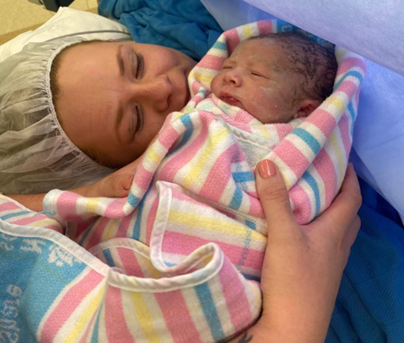Birth Trauma
Suicide is one of the leading causes of death for women in the first 12 months after birth.
Partners can also experience birth trauma.
Birth trauma is not often discussed by new Mums. They are so busy caring for their child and in some instances the loss of their child or illness /injury to their child or self that they don’t know who to turn to for support.
Hopefully, in time, Mums will feel comforted and supported to open up with the medical profession, their families and community and get the support that they need.
A woman can experience both physical and psychological birth trauma. The trauma can lead to not being able to bond with the baby, marriage breakdowns, job loss and both Post Natal Depression, Anxiety and Post Traumatic Stress Disorder.
My service focusses on Mum’s and partners psychological and emotional trauma.
Melissa experienced a 2-day labour after weeks of showing signs of pre-eclampsia without adequate hospital care and frequent visits to hospital and subsequent discharge.
Her trauma began when she didn’t get adequate pain relief during labour and was held back from the labour ward because it was full. This meant that the pain relief available to her in a normal ward could not be administered like it would have been in the labour ward.
Eventually, after being admitted to the delivery suite, an epidural and a significant birth injury, Melissa was sleep deprived and discharged home into community nursing care.
Sometime after discharge and being at home Melissa experienced Post-Partum Eclampsia, was rushed via Ambulance to hospital and admitted to ICU. The physical trauma followed with emergency treatment and psychologically she was terrified that she would die.
That fear remained amongst other real life, long term medical issues and as a result PTSD, Depression and Anxiety became overwhelming.
Melissa worked hard with me and her trauma therapy to decrease her fears and memories attached to the birth and the life-threatening situation that followed. Eventually Melissa was able to manage her fear and get back to work very aware of her trauma triggers and what to do when they arrived.

Babies and Toddlers
Traumatic and life-threatening events may include incidents such as car accidents, bushfires, sudden illness, a traumatic death in the family, crime, separation, abuse or violence in the family or community.
These days, Pandemic trauma can be very stressful and traumatic for the whole family which in turn can be traumatic for babies and toddlers.
They are also affected if their mother, father or main caregiver is suffering the consequences of the trauma.
If their home and routine become unsettled or disrupted as a result of the trauma, babies and toddlers are also vulnerable. Trauma can seriously disrupt important aspects of child development that occur before the ages of three years. These may include bonding with parents, as well as foundational development in the areas of language, mobility, social and physical skills and managing emotions.
There is increasing evidence to suggest that the younger a child, the more serious the post-traumatic problems. Actively seeking advice and support is important.
Support and therapy for parents, caregivers, babies and toddlers is critical.
The earlier the better.
Vanessa experienced significant trauma as a parent during the Blue Mountains Bushfires. She lost her home and had to rebuild with 2 children under the age of 4. As a result of losing their home they were displaced into emergency accommodation and then rental accommodation outside of their community.
Vanessa experienced PTSD as a result of the fire and her children were at home with her when she had to evacuate in an emergency with sirens, helicopters, smoke and ash and leaving with a handful of possessions. The children became unsettled, with sleep disturbances and became clingy to Vanessa. They resisted day care and being cared by anyone outside of Vanessa.
Vanessa sought support for her own trauma (PTSD), dealing with her trapped fear for future events and as she improved her children became more settled. She sought appropriate reviews and support for her children and gradually settled back into her existing community support systems.

Trauma - children and young people – common reactions
Young people can also be deeply upset by local, national or international tragedies such as war, the Pandemic and Climate Change, or trauma that affects their friends. Young people will handle trauma differently to younger children or adults. A younger child depends directly on their family, whereas many teenagers look to their peer group for support. In order to help them, parents need to understand the ways in which teenagers manage distress.
Bullying also causes trauma and is a serious and sometimes life-threatening issue.

Harry experienced the death of his mother to suicide. He was 13 at the time and his mother was a single Mum with a variety of life issues including drug abuse and serious mental health concerns. The death was partly expected but was traumatic and impacted the entire family and extended family.
The death of his Mum meant separation from his siblings and a new living environment. He became depressed and anxious and struggled at school. His carers became distressed about his reactions and level of aggression at school and at home. He withdrew more and more as months progressed until they sought support.
I provided gentle relaxation, clinical hypnotherapy and specialised trauma work to support his feelings of grief and loss while simultaneously working with the trauma of his mother’s sudden death. We made slow progress so he could adequately express his feelings to provide him relief from the intensity of his emotions and worked with many members of the family so that they could get the support they needed to manage their own grief and trauma and that of my client and his siblings.
We also looked at ways to honour Harry’s Mum that were respectful and meaningful to him.
Common reactions to trauma in teenagers
- Difficulties with short-term memory, concentration and problem solving
- Strong emotions such as sadness, anger, anxiety and guilt
- Overreacting to minor irritations
- Repetitively thinking about the traumatic event and talking about it often
- Disturbed sleeping patterns
- Withdrawing from family and friends
- Wanting to spend more time alone
- Being very protective of family and friends
- Returning to younger ways of behaving including giving up responsibilities or a sudden return to rebellious behaviour
- Increased need for independence
- Self-absorption and caring only about what is immediately important
- Loss of interest in school, friends, hobbies, and life in general
- Pessimistic outlook on life, being cynical and distrusting of others
- Depression and feelings of hopelessness
Young people and independence
For young people, friends and peer groups are very important. By comparing themselves with their friends, a young person gets a sense of how ‘normal’ they are. Young people tend to seesaw between independence and insecurity after a distressing event. This sort of contradictory behaviour can be confusing to the young person and to the parents trying to help them.
Breakdowns in communication
Some of the reasons for this include that they:
- Are wanting to be strong for parents and other family members
- Don’t think their parents will understand them
- Think that parents will tell them what to feel or what to do
- Don’t agree with their parents’ point of view on the event
- Prefer to talk to their peers about it
- Find that peers help take their mind off the event
- Feel confused about how they think and feel about the event
- Don’t know how to express complicated, unfamiliar thoughts
- Are frightened of strong feelings and fear they are ‘losing the plot’
- Would rather distract themselves than think about the event
- Already have a problem with communication before the event
- Are needing more time to absorb what happened
- Are not wanting to acknowledge the event by talking about it
- Don’t want to upset their parents
Family problems that can develop after a traumatic event
Family problems can occur if:
- The family doesn’t talk about the event
- The family misunderstands the teenager’s behaviour and assumes the teenager is just being difficult or taking advantage of the situation
- Parents try to keep the teenager from their peer group or criticise their choice of friends
- Parents feel hurt or angry because the teenager prefers to talk to friends about the event rather than the family
- The family argues over different points of view
- Parents try to get emotional support from the teenager
Tips to help children and young people resolve traumatic reactions
Some suggestions include:
- Encourage the young person to communicate without judging or advising them until they ask for your feedback
- Show them that you really care for them and are genuinely interested and enjoy being with them
- Negotiate changes in roles and responsibilities during recovery and be flexible. Don’t try to stick rigidly to the way things were before the event
- Continue to give love, support and trust, even if things are extremely difficult.
- Remember your child and young person is the same person they were before the event, even if they seem different
- If asked, gently let the child/young person know that they are having a ‘normal’ reaction to a frightening experience and that in time these very strong reactions will subside
When to seek help after a traumatic event
Signs that you should seek professional help include:
- Their behaviour is dangerous, reckless or harmful
- They become verbally or physically abusive
- They seem persistently depressed or anxious
- They start abusing substances, such as drugs, cigarettes or alcohol, or their use increases dramatically
- They won’t communicate about where they’re going, what they’re doing or how they’re feeling
- They don’t seem to be showing any signs of recovery
- Their behaviour does not make sense to you and seem completely out of character
- You are worried about them for any reason at all
- They look unwell

